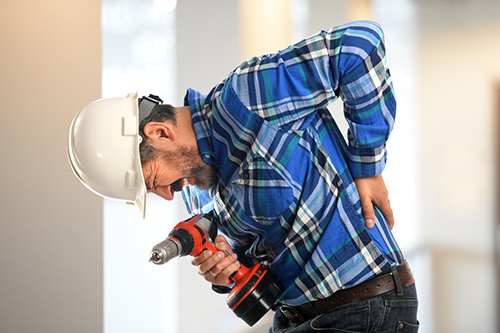
According to the Bureau of Labor Statistics, there were 2.8 million nonfatal workplace injuries and illnesses within the private industry sector in 2019. No profession is completely safe from getting hurt while on the job — even those that have a desk job are at risk for getting some type of injury. Injuries can happen at any time and from anywhere. A large portion of orthopaedic workplace injuries are caused by overexertion, repetition, and falls. In this blog, we’ll discuss these common types of injuries and the professions that are at high risk for injury.
Orthopaedic Workplace Injuries
Overexertion
Overexertion injuries are the most common type of workplace injuries. They typically happen when you push your body past its physical limits. It can happen from a single traumatic event or something that has gradually gotten worse over time. Common overexertion injuries are caused by lifting, pulling, holding, carrying, throwing, or pushing. As a result, employers need to educate their employees on the proper way to perform these functions, such as using correct posture, techniques, and taking breaks.
Types of Overexertion Injuries
- Back injuries
- Muscle strains
- Neck injuries
- Joint and tendon injuries
- Heat exhaustion
Professions Likely to Experience Overexertion
- Truck drivers
- Construction workers
- Movers
- Waste collectors
- Retail workers
- Warehouse workers
- Restaurant workers
Repetitive Motions
Most jobs require repetitive motion to complete a task, and over time this can cause wear and tear on the body. While these types of injuries may not be noticeable in the beginning, they will likely worsen and become painful. Stress and strains can be caused by these repetitive motions: typing on the computer, working on an assembly line, having poor posture while sitting at a desk, or reaching overhead for a long period of time. As an employer, you can help prevent repetitive motion injuries by encouraging breaks and improving workplace ergonomics. This training can teach employees the importance of good posture and positioning that will help their bodies stay pain-free.
Types of Repetitive Motion Injuries
- Carpal tunnel
- Tendinitis
- Bursitis
- Rotator cuff injuries
Professions Likely to Experience Repetitive Motion Injuries
- Office workers
- Factory workers
- Carpenters
- Nurses
- Bus drivers
- Hairdressers
- Janitors
- Professional athletes
Falls, Trips, or Slips
A fall, trip, or slip can happen at any workplace. As an employer, this is why it’s so important to mark (or fix) areas that are hazardous — even if it’s a slick spot on the floor, an outstretched extension cord, an uneven surface, or an icy sidewalk. If you see potential hazards in your workplace, speak up about them and request a change. Depending on the surface and how you fall, it could lead to some serious injuries. Identifying unsafe situations can help keep you and your co-workers happy and healthy.
Types of Injuries from Falls, Trips, or Slips
- Soft tissue injuries
- Concussions and traumatic brain injuries
- Hip fractures
- Back and spinal cord injuries
- Sprains and fractures
- Cuts and abrasions
Professions Likely to Experience a Fall, Trip, or Slip
- Construction workers
- Nurses
- Laborers and material movers
- Food service workers
- Waiters
- Janitors
- Professional Athletes
Schedule an Appointment
If you’ve experienced a workplace injury from overexertion, repetitive motion, or falling (or any other traumatic event), schedule an appointment with Prairie Orthopaedic & Plastic Surgery in Lincoln, NE. Our board-certified orthopaedic surgeons, physician assistants, and physical therapists are known for their excellent service and care. Our rehabilitative strategies are customized to meet your specific needs and offer you the most advanced treatment options for recovery of maximum mobility, strength, and return of function. We’re ready to assist you and get you back to work again! To schedule an appointment, please call 402-489-4700.

